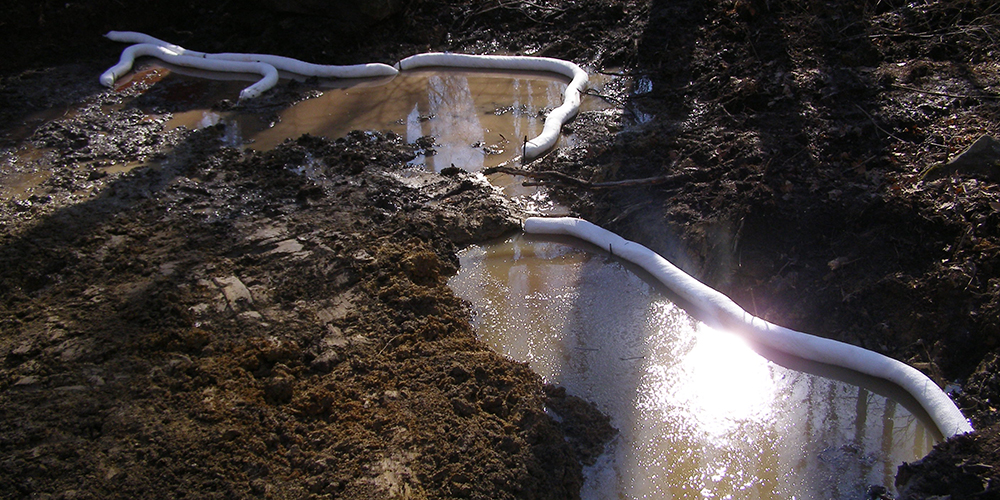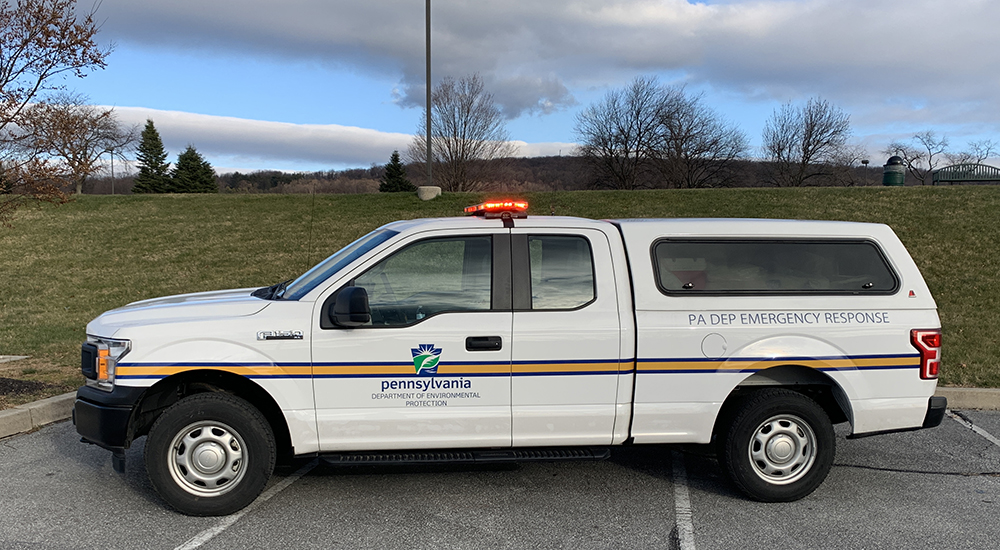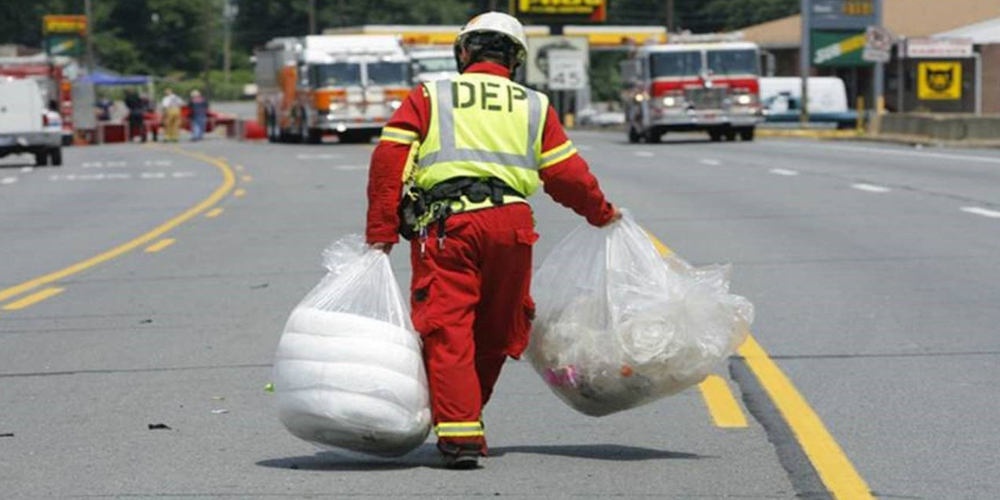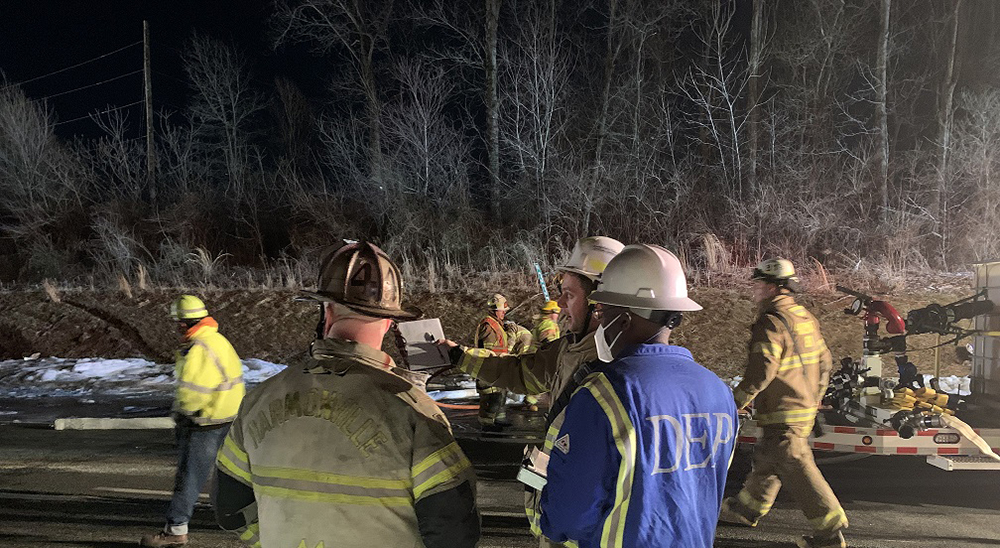To report an environmental emergency call 1-800-541-2050
Strong odors, oil sheens, water main breaks, streams and creeks that just don’t look right. These are all examples of environmental complaints or emergencies that can be submitted to DEP. DEP receives complaints and emergencies 24 hours a day, 7 days a week, 365 days a year and responds as appropriate to investigate issues or concerns that may be having an adverse effect on the environment.
While the line between an environmental complaint and an environmental emergency can be blurry, it’s important to notify DEP when something just doesn’t seem right. Complaints are typically for ongoing concerns that can be handled during business hours, while emergencies tend to refer to active situations that require immediate attention. DEP has duty officers on call 24/7 to receive emergency calls who evaluate all incoming notifications to determine the level of response warranted.
Because complaints and emergencies are managed directly by the regional offices, tagging DEP on social media does not trigger a response action from DEP. While staff can’t be everywhere at all times, we rely on the public to be a partner and alert us to environmental issues so we can properly investigate.

Complaints
Complaints are first received by a Service Representative, who enters it into a tracking system, assesses its urgency, and refers it to the appropriate DEP program for follow-up. Typical complaints may be idling vehicles, erosion or sedimentation issues, illegal dump sites, or other environmental concerns. Once referred to program, staff will take the appropriate actions to investigate and find a way to address the concern.
Environmental complaints can be phoned in to each of the regional offices or submitted via the online form.
Common complaints:
- Air Quality – Outdoor air issues, compressor stations, outdoor wood burners, dust
- Clean Water – Sewage treatment plants, pollution to waterways
- Safe Drinking Water – Public water supplies
- Waste Management – landfills, commercial dumping & burning
- Waterways & Wetlands – wetlands issues, dams, waterway obstructions and encroachments, construction site runoff
- Oil & Gas – Abandoned wells, gas migrations, private water supplies impacted by O&G activities
Emergencies
An environmental emergency is a situation requiring an immediate response. This may include an active discharge, discoloration of a waterway, a fish kill, spilled material, or other situation threatening public health and safety or the environment in some way that must be addressed in real time.
Depending on the situation or circumstances, DEP will often reach out to local jurisdictions to coordinate the necessary response. This may involve referring a call to a local fire department or requesting assistance from another state agency or federal partner. DEP also recently updated the look of our Regional Emergency Response vehicles to help enhance visibility on roadways and to help make DEP Emergency Response staff easily identifiable when responding to emergencies.

Once the initial response has concluded, DEP’s emergency response team will refer the matter to the appropriate program(s) for follow up.
Spills and other emergencies should be reported immediately to DEP by calling 1-800-541-2050.
It’s important to remember that DEP ultimately makes the final determination on whether a notification constitutes an emergency requiring an immediate response or if it can be referred to program staff and responded to during business hours.

On scene presence
When arriving on scene, DEP inspectors and/or emergency responders are there to assess the extent of environmental impacts, coordinate with the responsible parties (if known), assist with the initial containment of spilled materials and ensure a plan is in place for the removal of the materials from the environment. This may include directing the placement of absorbent booms in a waterway to stop pollutants from a spill or working with an environmental cleanup contractor, local responder or responsible party to address contaminants spilled on the ground. DEP files an incident report and will stay on scene until no longer needed. This can last for several hours to several days, depending on the severity of the emergency and the environmental impacts.

Remember!
It is important to remember that all complaint and emergency calls need to be directed to the appropriate phone numbers and/or online submission form and not sent directly to individual employees. Staff may be on leave, away from their computers, in trainings, in the field, or otherwise unavailable. Important and time sensitive reports may be missed. Filing complaints and reporting environmental emergencies to the appropriate numbers allows the report to be responded to quickly, tracked and referred, and followed up on using established protocols and procedures.